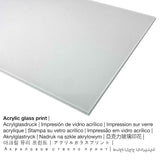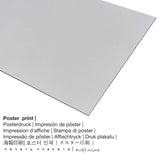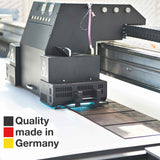Corrado Giaquinto, 1754 - Allegory of Peace and Justice - fine art print
Tax included. Shipping calculated at checkout.
Allegory of Peace and Justice is an artwork made by the baroque Italian artist Corrado Giaquinto in 1754. The version of the work of art measures the size: 16-1/8 x 27-1/4 in and was painted with the technique oil on canvas. Nowadays, the artpiece is part of the collection of Indianapolis Museum of Art, which is one of the finest universal art museums that has an extensive collection of art history from different eras with objects from all parts of the world.. We are delighted to state that the public domain artpiece is being included with courtesy of Indianapolis Museum of Art.The creditline of the artwork is the following: . Besides, the alignment of the digital reproduction is landscape with a side ratio of 16 : 9, which means that the length is 78% longer than the width. The painter Corrado Giaquinto was an artist, whose artistic style can be classified as Baroque. The Italian artist was born in 1703 in Molfetta, Bari province, Apulia, Italy and deceased at the age of 63 in the year 1766 in Naples, Napoli province, Campania, Italy.
Choose your material
For every product we offer a range of different materials and sizes. The following sizes and materials are the options we offer you for individualization:
- The canvas print: A UV printed canvas material applied on a wooden frame. A canvas generates a sculptural impression of three dimensionality. How can I hang a canvas print on the wall? The advantage of canvas prints is that they are relatively low in weight, which implies that it is quite simple to hang up the Canvas print without the support of additional wall-mounts. Canvas prints are suitable for any kind of wall.
- Poster print (canvas material): The poster print is a UV printed flat canvas with a nice finish on the surface. A poster print is particularly suited for placing your art replica with a custom-made frame. Please bear in mind, that depending on the size of the canvas poster print we add a white margin of around 2-6cm round about the work of art, which facilitates the framing with your custom frame.
- Aluminium dibond (metal print): An Aluminium Dibond print is a print material with an outstanding depth effect - for a modern look and non-reflective surface. A direct Aluminium Dibond Print is your ideal introduction to the sophisticated world of fine art reproductions with aluminum. For the Print On Aluminum Dibond, we print your artpiece onto the aluminium surface. The colors are luminous and bright, fine details of the print appear clear and crisp.
- Acrylic glass print (with real glass coating): The acrylic glass print, often named a plexiglass print, will transform your favorite original artwork into great décor. The plexiglass protects your chosen art replica against sunlight and heat for many decades.
Legal disclaimer: We try whatever we can to describe the products as accurate as possible and to illustrate them visually in our shop. Although, the tone of the printed materials and the printing may differ to a certain extent from the representation on the screen. Depending on your screen settings and the condition of the surface, color pigments might not be printed 100% realistically. Since our art reproductions are processed and printed manually, there may as well be minor deviations in the motif's exact position and the size.
About this product
| Product type: | art copy |
| Method of reproduction: | digital reproduction |
| Production method: | UV direct print |
| Production: | Germany |
| Type of stock: | production on demand |
| Proposed product use: | gallery wall, art print gallery |
| Image orientation: | landscape alignment |
| Image ratio: | 16 : 9 (length : width) |
| Aspect ratio interpretation: | the length is 78% longer than the width |
| Available reproduction fabrics: | acrylic glass print (with real glass coating), canvas print, metal print (aluminium dibond), poster print (canvas paper) |
| Canvas print (canvas on stretcher frame) size variants: | 90x50cm - 35x20", 180x100cm - 71x39" |
| Acrylic glass print (with real glass coating) variants: | 90x50cm - 35x20" |
| Poster print (canvas paper) size variants: | 90x50cm - 35x20" |
| Aluminium dibond print (aluminium material) options: | 90x50cm - 35x20" |
| Frame: | unframed art copy |
Background information on the piece of art
| Painting name: | "Allegory of Peace and Justice" |
| Categorization: | painting |
| Category: | classic art |
| Artwork century: | 18th century |
| Created in the year: | 1754 |
| Artwork age: | over 260 years old |
| Original medium of artwork: | oil on canvas |
| Dimensions of the original artpiece: | 16-1/8 x 27-1/4 in |
| Museum / collection: | Indianapolis Museum of Art |
| Location of the museum: | Indianapolis, Indiana, United States of America |
| Museum website: | Indianapolis Museum of Art |
| License type of artwork: | public domain |
| Courtesy of: | Indianapolis Museum of Art |
Artist overview
| Artist name: | Corrado Giaquinto |
| Additional names: | Corado de Rome, Giaquinto, Corado, Giaquinto Corrado, Giacinto Corrado, Cavaliere Corrado Giaquinto, Chevalier Currado Giaquinto, Cav. Corradi, Corrado Giaquinto, hyacinth corrado, Corrado Giacquinto, Corrado |
| Gender: | male |
| Nationality of artist: | Italian |
| Professions: | painter |
| Country: | Italy |
| Artist classification: | old master |
| Styles of the artist: | Baroque |
| Died aged: | 63 years |
| Year of birth: | 1703 |
| Place of birth: | Molfetta, Bari province, Apulia, Italy |
| Year died: | 1766 |
| Deceased in (place): | Naples, Napoli province, Campania, Italy |
© Copyright of, Artprinta.com (Artprinta)
Original artwork information by Indianapolis Museum of Art (© - by Indianapolis Museum of Art - Indianapolis Museum of Art)
This sketch is a study for a painting for the Royal Palace, Madrid. The allegory alludes to Ferdinand VI’s fair and peaceful reign. Clad in luminous pink and white, Peace holds an olive branch in her hand, while her companion, Justice, is seated above a sword and scales. The dead youth refers to the resolution of the War of Succession waged under the king’s father, Philip V.
Called to the Spanish court in 1753, Giaquinto would spend nearly a decade in Spain, where he was named first painter to the king and director of the Madrid Academy. Engaged in several large-scale decorative projects, Giaquinto left behind many preparatory studies, of which this is an example.
Indianapolis Museum of Art














